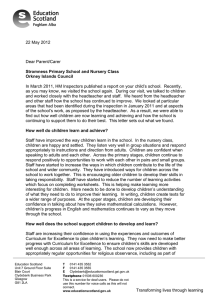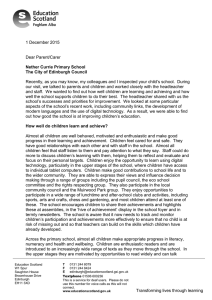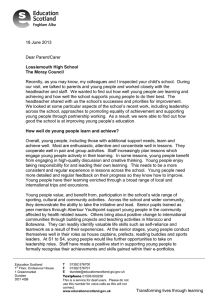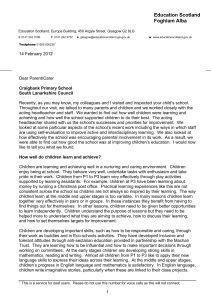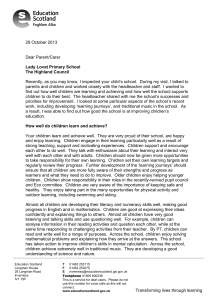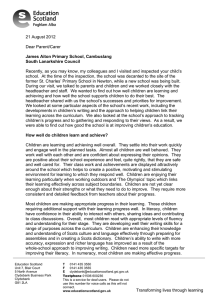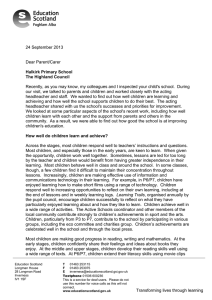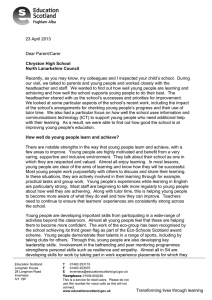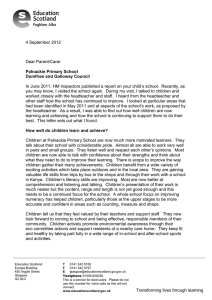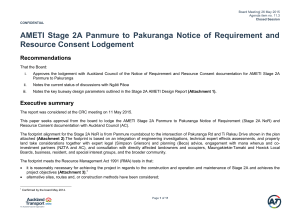12 April 2016 Dear Parent/Carer ’s school. During
advertisement
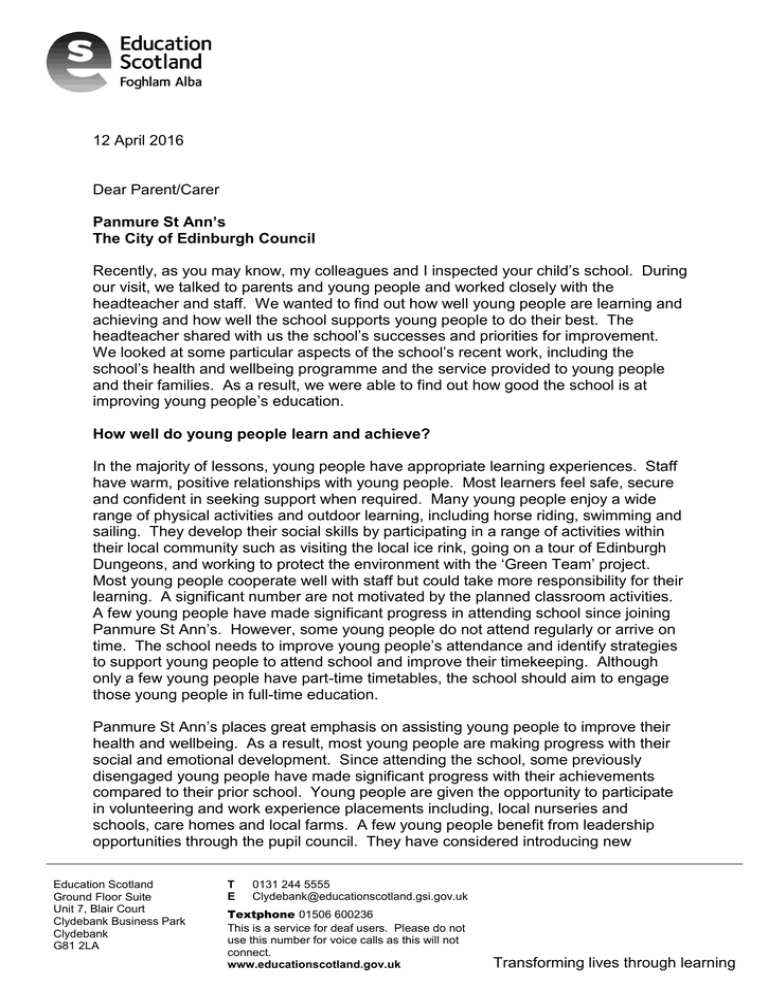
12 April 2016 Dear Parent/Carer Panmure St Ann’s The City of Edinburgh Council Recently, as you may know, my colleagues and I inspected your child’s school. During our visit, we talked to parents and young people and worked closely with the headteacher and staff. We wanted to find out how well young people are learning and achieving and how well the school supports young people to do their best. The headteacher shared with us the school’s successes and priorities for improvement. We looked at some particular aspects of the school’s recent work, including the school’s health and wellbeing programme and the service provided to young people and their families. As a result, we were able to find out how good the school is at improving young people’s education. How well do young people learn and achieve? In the majority of lessons, young people have appropriate learning experiences. Staff have warm, positive relationships with young people. Most learners feel safe, secure and confident in seeking support when required. Many young people enjoy a wide range of physical activities and outdoor learning, including horse riding, swimming and sailing. They develop their social skills by participating in a range of activities within their local community such as visiting the local ice rink, going on a tour of Edinburgh Dungeons, and working to protect the environment with the ‘Green Team’ project. Most young people cooperate well with staff but could take more responsibility for their learning. A significant number are not motivated by the planned classroom activities. A few young people have made significant progress in attending school since joining Panmure St Ann’s. However, some young people do not attend regularly or arrive on time. The school needs to improve young people’s attendance and identify strategies to support young people to attend school and improve their timekeeping. Although only a few young people have part-time timetables, the school should aim to engage those young people in full-time education. Panmure St Ann’s places great emphasis on assisting young people to improve their health and wellbeing. As a result, most young people are making progress with their social and emotional development. Since attending the school, some previously disengaged young people have made significant progress with their achievements compared to their prior school. Young people are given the opportunity to participate in volunteering and work experience placements including, local nurseries and schools, care homes and local farms. A few young people benefit from leadership opportunities through the pupil council. They have considered introducing new Education Scotland Ground Floor Suite Unit 7, Blair Court Clydebank Business Park Clydebank G81 2LA T E 0131 244 5555 Clydebank@educationscotland.gsi.gov.uk Textphone 01506 600236 This is a service for deaf users. Please do not use this number for voice calls as this will not connect. www.educationscotland.gov.uk Transforming lives through learning uniforms and reducing access to fizzy drinks to improve young people’s health. Overall, there is scope to raise the achievement of young people both at the broad general education and the senior phase. In particular, young people need further support to build the skills required to make a successful transition into work, training or further education. The majority of young people achieve an appropriate range of course awards and units at National 3 and National 4 in English, mathematics, religious education, and social studies. They achieve particularly well in English and social subjects. Young people now have opportunities to achieve in physical education, administration, biology and chemistry. In English, a few young people are developing writing skills well, particularly in writing for information and imaginative writing. However, too many literacy-based activities in the school focus on discussion. Young people need more time dedicated to developing their skills in reading, writing and listening. Most young people are making satisfactory progress in developing their skills and understanding of numeracy. Young people are at various stages of developing their skills and understanding of shapes, pattern and symmetry, and fractions. All young people have the opportunity to develop their understanding of how to keep themselves safe and healthy through group work lessons. This includes exploring the effects of alcohol abuse, strategies for dealing with bullying, and healthy eating. How well does the school support young people to develop and learn? Tasks, activities and resources are appropriate to the needs of the majority of young people. Most lessons build on prior learning. Small class sizes allow staff to plan flexibly for young people who may need their own space at points during the day. However, young people’s poor attendance and latecoming often leads to the pace of learning being too slow in many classes. As a result, some young people are not being challenged appropriately by learning activities. Most staff are knowledgeable about young people’s social, emotional and health needs. Group workers play a strong role in supporting young people to access education. They provide personalised support to young people and their families to support them at home, at school and within their communities. Most young people are making satisfactory progress towards achieving targets set within individualised educational programmes. The school needs to revisit the rationale for the curriculum in order to set out a clear vision based on shared values and young people’s needs. Across the school, young people experience learning in a limited number of subject areas. There are insufficient opportunities for learners to exercise choice in what or how they learn. Staff need to put clear plans in place to develop better programmes of learning in line with Curriculum for Excellence. For example, there are too few opportunities for young people to gain work related qualifications. There is significant scope to involve partner agencies more fully in planning and delivering aspects of the school’s curriculum. How well does the school improve the quality of its work? The headteacher has been successful in developing positive relationships across the school. She is ably supported by a depute headteacher and collectively they have gained the respect of the whole school community. Led by the headteacher, staff throughout Panmure St Ann’s are committed to school improvement. The school has 2 a number of systems in place to help identify where it is successful and what it needs to do to improve. However, more evidence needs to be gathered to help identify key priorities. Senior managers could make better use of information about young people’s attendance, behaviour, engagement, and achievements. The school does not yet have sufficient evidence of self-evaluation activities leading to improved outcomes for young people. This inspection found the following key strengths. Positive relationships across the school established by senior managers. Group workers’ support for young people and their families. Opportunities for young people to learn within their local community. We discussed with staff and The City of Edinburgh Council how they might continue to improve the school. This is what we agreed with them. As a matter of priority, take steps to improve young people’s attendance and timekeeping. Increase expectations of young people’s attainment and achievement. Develop the curriculum in line with national guidance to ensure young people receive their full entitlements to a broad general education and senior phase. Take a more rigorous approach to self-evaluation and tracking young people’s progress. What happens at the end of the inspection? We are satisfied with the overall quality of provision. We are confident that most of the school’s self-evaluation processes are leading to improvements. Our Area Lead Officer will work with The City of Edinburgh Council to build capacity for improvement and will maintain contact to monitor progress. Parents will be informed of the extent to which the school has improved as part of the local authority’s quality assurance arrangements. Steven McPherson HM Inspector Additional inspection evidence, such as details of the quality indicator evaluations, for your school can be found on the Education Scotland website at http://www.educationscotland.gov.uk/inspectionandreview/reports/school/primsec/Pan mureStAnnsEdinburgh.asp If you would like to receive this letter in a different format, for example, in a translation please contact the administration team on the above telephone number. If you want to give us feedback or make a complaint about our work, please contact us by telephone on 0131 244 4330, or e-mail: complaints@educationscotland.gsi.gov.uk or write to us addressing your letter to the Complaints Manager, Denholm House, Almondvale Business Park, Livingston EH54 6GA. 3
